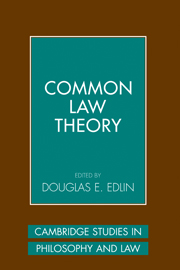3 - The Principles of Legal Reasoning in the Common Law
Published online by Cambridge University Press: 17 September 2009
Summary
The purpose of this chapter is to develop the principles that should, and largely do, govern legal reasoning in the common law. By the common law, I mean judge-made law, and by judge-made law, I mean law made by the courts taken as a whole.
Four Foundational Ideas
I begin with four ideas that provide the foundation of the principles developed in this chapter: (1) courts should make law concerning private conduct in areas where the legislature has not acted, (2) the principles of legal reasoning turn on the interplay between doctrinal propositions and social propositions, (3) legal rules can be justified only by social propositions, (4) consistency in the common law depends on social propositions.
Courts Should Make Law
The first foundational idea is that courts should make law concerning private conduct in areas where the legislature has not acted. Like other complex institutions, common law courts serve several social functions, but two of these are paramount. The first concerns the resolution of private disputes. The second is the enrichment of the supply of legal rules to empower and govern private conduct. Our society has an enormous demand for legal rules that private actors can live, plan, and settle by. The legislature cannot adequately satisfy this demand. The capacity of a legislature to generate legal rules is limited. Moreover, much of that capacity must be allocated to the production of public-law rules and to matters such as budgets, taxation, governmental organization, and public administration.
- Type
- Chapter
- Information
- Common Law Theory , pp. 81 - 101Publisher: Cambridge University PressPrint publication year: 2007
- 6
- Cited by

